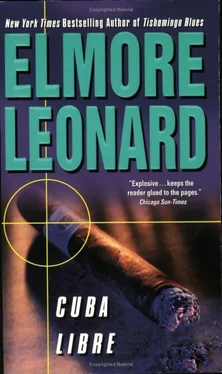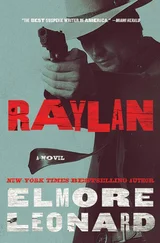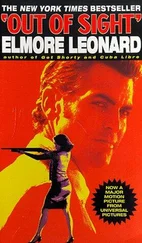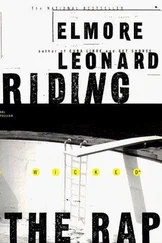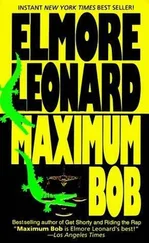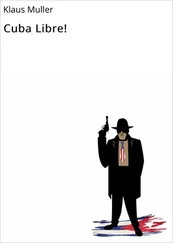Elmore Leonard - Cuba Libre
Здесь есть возможность читать онлайн «Elmore Leonard - Cuba Libre» весь текст электронной книги совершенно бесплатно (целиком полную версию без сокращений). В некоторых случаях можно слушать аудио, скачать через торрент в формате fb2 и присутствует краткое содержание. Жанр: Исторические приключения, на английском языке. Описание произведения, (предисловие) а так же отзывы посетителей доступны на портале библиотеки ЛибКат.
- Название:Cuba Libre
- Автор:
- Жанр:
- Год:неизвестен
- ISBN:нет данных
- Рейтинг книги:5 / 5. Голосов: 1
-
Избранное:Добавить в избранное
- Отзывы:
-
Ваша оценка:
- 100
- 1
- 2
- 3
- 4
- 5
Cuba Libre: краткое содержание, описание и аннотация
Предлагаем к чтению аннотацию, описание, краткое содержание или предисловие (зависит от того, что написал сам автор книги «Cuba Libre»). Если вы не нашли необходимую информацию о книге — напишите в комментариях, мы постараемся отыскать её.
Cuba Libre — читать онлайн бесплатно полную книгу (весь текст) целиком
Ниже представлен текст книги, разбитый по страницам. Система сохранения места последней прочитанной страницы, позволяет с удобством читать онлайн бесплатно книгу «Cuba Libre», без необходимости каждый раз заново искать на чём Вы остановились. Поставьте закладку, и сможете в любой момент перейти на страницу, на которой закончили чтение.
Интервал:
Закладка:
Oh, was that right? Then how come he couldn't move?
Virgil heard men screaming.
He heard a man moaning, calling for his mother. He heard a voice fairly close by saying, "I can't move my legs." And a voice saying, "I can't see. Will somebody help me? I can't see."
The screaming and moaning went on and on, not close by but somewhere else in the room or ward or wherever he was.
A hand touched his face, moved back and forth in front of his eyes. A woman's voice without an accent said, "Can you hear me?"
She wasn't one of the nurses; they talked in Spanish or had accents. He wanted to ask her what she thought he was doing, sleeping with his eyes open?
The woman's voice said to somebody else, "There is so little we can do."
A man's voice said, "Miss Barton?" and then said something to her Virgil couldn't make out.
The woman's voice said, "I've been able to identify only twelve so far. Many are so horribly burned." Virgil heard her sigh. "And the rest-I'm told as many as two hundred are still in the ship."
Virgil was sure he wasn't burned or he'd feel it. He heard the woman say she'd been in the provinces distributing food to the reconcentrados, Cubans the dons locked up in camps to starve to death. The woman sounded kind of old. Then, close to him, he heard her say, "Dear, can you tell me your name?"
He was Private Virgil Webster, a seagoing marine off the USS Maine, but for some reason couldn't form the words to tell her. He wanted to. Christ, yes. Virgil Webster. Home: Okmulgee, Indian Territory. Left there to become a fighting marine. Look at my tattoos. Semper Fi on one arm, with the Marine Corps insignia. In Memory of Mother on the other, though it didn't mean his ma was dead, he just liked the looks of it, the flower and the gravestone cross. But somebody better tell her he wasn't dead either, else she'd see a newspaper or hear about the Maine and be worried to death. His ma was part northern Cheyenne.
Virgil Webster, twenty-four years old and into his second five-year enlistment. Joined when he was sixteen, inspired by stories his uncle Hartley Webster told. Uncle Hartley a marine who'd fought in Korea in the spring of '71: steamed up the Han River aboard a gunboat and beat hell out of the Koreans for mistreating American merchant seamen, killed two hundred fifty of them and lost only two marines. Virgil joined up looking for action: guarded a quarantine camp at Sandy Hook, New Jersey, for people who'd come off ships immigrating here and were found to have cholera. He guarded Southern Pacific railroad yards during a strike and marched in the dedication ceremony of Grant's Tomb. He got in trouble once in Venezuela, there protecting a consulate, part of a marine detachment off the USS Chicago. They all got drunk and the captain was court-martialed. Guayra, Venezuela… Reupped in Norfolk.
Assigned to the USS Maine November the tenth of last year at Newport News, Virginia, where she was taking on coal. January the eighteenth she was coaled again at Key West. January the twenty-fourth, with the North Atlantic Squadron sixty miles off Key West, the torpedo boat Dumont came alongside to deliver a message from the Navy Department. By 11:00 P.M. the Maine had her steam up and was bound for Havana. Twelve hours later a Spanish pilot was bringing her into the harbor. A rumor had gone around they'd be in New Orleans for Mardi Gras, representing the fleet. Well, they were supposed to have pretty much the same kind of carnival here, so Havana didn't sound too bad. Except, as it turned out, none of the crew was allowed ashore, just officers. Virgil asked Captain Sigsbee's orderly, twenty-eight years in the military, with the army out West half of it and now a career marine, "How come just the officers?"
Sigsbee's orderly said, "Because the dons don't like it we're here to begin with, and you smart alecks'd be sure to make trouble."
Virgil asked the career marine, who heard things on the bridge and standing outside the captain's quarters, "How come we are here?"
"Making a friendly call on the dons."
"We got here and sat out in the stream till it was good and light so as not to surprise them coming in." "Is that a question?"
"When did we become friends with them?"
"Would you understand the situation if I explained it to you?"
"Well, I been to school."
"How far?"
"The sixth grade."
"We're here to protect American citizens and their property."
"Protect them from what?"
"Unenlightened people with anti-American aims. Or," the career marine said, "you could say we're here in case it looks like the Cubans are gonna take over their own country before we get a chance to do it ourselves. But don't tell nobody. That's between Captain Sigsbee, the Secretary of the Navy and Bill McKinley."
So Virgil never got to go ashore. One of the midshipmen who did, delivering messages to the consulate, said the city was full of beggars and Spanish soldiers; he said people walked in the middle of the street, rode horses holding umbrellas over their heads, and the women wore so much white face powder they looked like they were dead. Virgil said he'd like to see them anyway. The midshipman said don't step in the gutters; some places there was poop in the gutters. He said hey, he bet that's why everybody walked in the middle of the street.
Tuesday, February the fifteenth, the sun set at 5:36 P.M.
There it was hanging over the outskirts of Havana and the next minute gone for the day, the way it did in the tropics, disappeared on you as you watched. The sky became overcast and pretty soon it was pitch-dark.
That afternoon they had set up targets to practice with their new Lee magazine rifles. Before long, though, there was the Alfonso XH in the background and rifle practice was halted in case the dons became nervous. Without anyone noticing it right away, the Maine had drifted on her anchor to a northwest heading, putting her starboard 10-inch battery on Morro Castle, on the old La Cabafia fortress next to it and on the Spanish warship. The Maine's port batteries were now bearing on the city. Virgil knew it was the wind and tide had put the ship in this heading-one they'd take if they were going to shell the city and its forts-but it had never happened before tonight. Strange. Officers and men were all talking about it.
At 8:00 I'. M. the Officer of the Deck reported the ship secure, all hands aboard except four officers who'd gone ashore on overnight liberty.
At 9:00 P.M. two bells, the bosun piped the ship down for the night: all hands not on watch lay below and turn in. Ten minutes later the marine bugler sounded taps. This night being hot and muggy they had permission to sling their hammocks topside if they wanted, go to sleep breathing flesh air.
Virgil picked a spot by the after turret on the port side, swung his hammock from the forward side of the turret to an engine-room skylight he managed to hook on to. He was ready to climb in the sack when he realized he was missing something important: the three-foot notched board he'd wedge across one end of the hammock, where he'd lay his head, to keep it spread open. Otherwise it was like sleeping in a cocoon. Virgil slipped below to the crew's berth, forward, but couldn't find his board anywhere, goddamn it; he was pretty sure some swabbie, trying to be funny, had hidden it. And it was too late now to go to the ship's carpenter shop, find the right piece of board, cut it to size and notch it. Shit. He had in mind to look for a swabbie already asleep and swipe his board. But it could end in trouble, and he'd already done 10 days' bread and water this cruise for fighting. As he went back topside three bells sounded. It was 9:30.
Two officers at the rail, aft of the turret, were watching a steam launch as it swung wide around the stern and headed for the Havana docks. Both officers were smoking cigs. Virgil remembered this, the smell of tobacco and their comments, wondering who the launch belonged to and where it had come from. There were boats out there all day long: bum boats coming alongside to sell different kinds of fruit and sweets; gigs and lighters chasing around the harbor like taxis with cargo or passengers; but hardly any this late.
Читать дальшеИнтервал:
Закладка:
Похожие книги на «Cuba Libre»
Представляем Вашему вниманию похожие книги на «Cuba Libre» списком для выбора. Мы отобрали схожую по названию и смыслу литературу в надежде предоставить читателям больше вариантов отыскать новые, интересные, ещё непрочитанные произведения.
Обсуждение, отзывы о книге «Cuba Libre» и просто собственные мнения читателей. Оставьте ваши комментарии, напишите, что Вы думаете о произведении, его смысле или главных героях. Укажите что конкретно понравилось, а что нет, и почему Вы так считаете.
